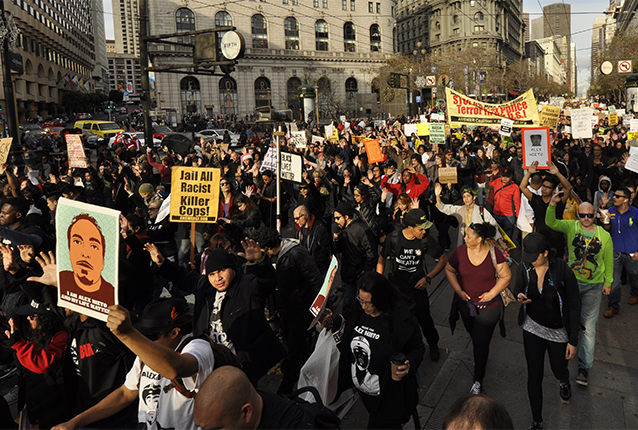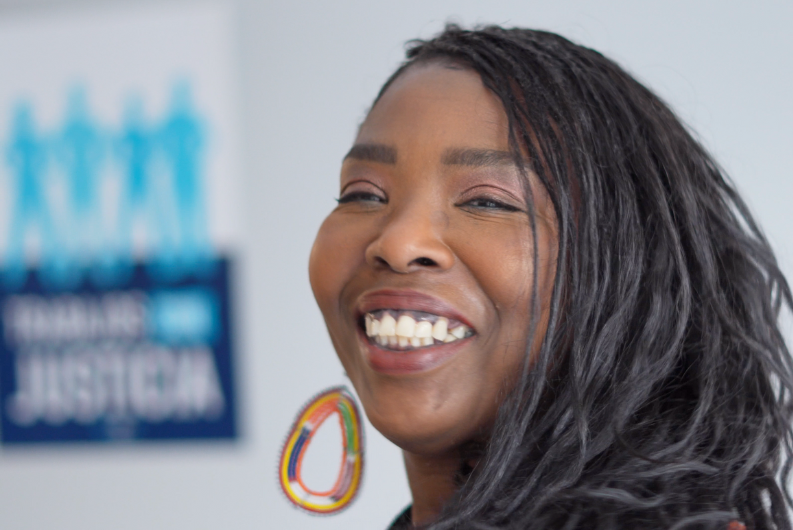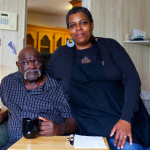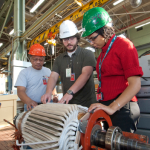This post is the first in a series about the Jobs With Justice network and the broader labor movement fighting for racial justice.
As the Black Lives Matter movement has taken off, much needed conversations about systemic racism in society have surfaced. As a result, many labor groups around the country have responded by exploring their role in addressing or exacerbating racial divides. In San Francisco, our Jobs With Justice local coalition has dedicated itself to the fight for racial justice in recent months by hosting educational events and working with local Black Lives Matter activists.
To learn more about Jobs With Justice San Francisco‘s engagement with Black Lives Matter and racial justice, we spoke with lead organizer Kung Feng. Read on to find out what the coalition has been working on, and why it’s crucial that the fight for economic justice also includes the fight for racial justice.
What does it mean to do work with a racial justice lens?
It’s really lifting up the ways that race matters in our lives. It matters when people are stopped for a traffic violation. It matters when kids like Trayvon are killed when coming back from the corner store. It matters when immigrant folks are separated from their families across multiple countries and when Donald Trump is calling them names. It’s called a racial justice lens because we’re enhancing our vision so we can see more clearly the dynamics that are already there.
One way that Jobs With Justice San Francisco (JWJ-SF) did this was in our work around the budgeting process here in San Francisco. The city was proposing spending tens of millions of dollars to increase the size of the police force, which has been rocked recently by racist scandals and continues to arrest and imprison Black people at a disproportionate rate.
How has the Black Lives Matter movement impacted the labor movement ?
Our vision has shifted. We pay more attention to race. There’s a conversation happening across the country and we’re starting to have that conversation in the labor movement.
There’s a huge level of awareness in the labor movement right now about the attack on the public sector, given the upcoming Supreme Court decision and events in Wisconsin. We have an opportunity to lift up how this is an attack on Black workers. The New York Times ran an article about how one in five Black adults work in the public sector. The public sector is where people were able to make significant advances and get good jobs, and now it’s under attack.
There was also a really great study of Black women’s leadership in the labor movement called “And Still I Rise.” I think we have a real opportunity to support Black women’s leadership. There’s been a lot of conversation around how the labor movement can revive itself in part by organizing Black women and how women of color are some of the most effective organizers.
Can you tell me about JWJ San Francisco’s work on racial justice?
Our work on racial justice began after one of our annual planning meetings where Black Lives Matter really became the top point of discussion for our member organizations. I think that was driven by the incredible movement on the ground and the work of Black activists. Some people really wanted to step up and participate, so we formed a Black Lives Matter working group which got started by planning a public forum called Black Lives Matter at Work.
Our work on racial justice has fallen into four categories: External education, internal education, mobilization and campaign work.
On the external education front, we’re facilitating education and dialogue around Black Lives Matter and its connection to economic justice. We held our Black Lives Matter at Work forum with 150 people where Alicia Garza (Black Lives Matter founder), Steven Pitts (Associate Chair of the UC Berkeley Labor Center), rank-and-file public sector employees and fast food employees from the Fight For 15 spoke. The goal of the forum was to connect economic justice, racial justice and Black liberation.
We’ve also done internal educational workshops for JWJ members, with a particular focus on Black workers. Within the coalition, we’ve been really trying to support sharing of curriculum. For example, AFSCME 3299 has done some really amazing work educating their executive board and doing workshops for union leaders.
We’ve been mobilizing our base to go to Black Lives Matter events and actions. On May Day, the ILWU shut down the port in Oakland in an action against police brutality, and many unions participated in that. There was also an action to take over city hall on April 14th to protest police killings, which was led by an SEIU member and her community organization.
Where we still need to do the most development is on our campaign work. We have a campaign called “Close the Gap” which works on closing the achievement gap between Black, Latino and Pacific Islander students in the school system. Also in K-12 education, the “Solutions not Suspensions” campaign looks at how the criminalization of Black youth starts really early on with suspensions in our schools. Finally, the budget campaign I mentioned earlier had to do with combatting police racism.
How do you see issues of police brutality relating to your mission?
Some of the connection is very immediate. Our community organizations are already working on police brutality. Our labor organizations are coming from a tradition of social justice unionism that actually believes that economic and social justice belong together.
There’s also a deeper question here about our organizational philosophy. We’re not just an alliance. We’re breaking down this divide between labor and community. You might be a worker organizing and fighting on the job. But when you go home back to your neighborhood, the organizing keeps going. Folks need better schools and affordable housing. They need to know that when their kids step out the door, they’ll actually come home alive. We need to affirm our humanity, especially the basic humanity of our Black brothers and sisters. And that means that Black Lives Matter.
If you look at the actual Black Lives Matter movement, it’s all about economic justice too. They’re making this connection between safety from police and ending poverty. The demands from Ferguson include full employment and decent housing. In Baltimore, a lot of people have made the connection too between extreme poverty and the very brutal policing of people.
The founders of Black Lives Matter have consistently been making this an issue of broader state violence, and how poverty is a form of state violence as well. This is an issue beyond police brutality. Race matters and there’s a war on Black people in the U.S.
Do you have any advice for others who want to engage more deeply in the Black Lives Matter movement?
It’s important to start by listening and learning from some of the Black organizing that’s happening already and build from there. I think there’s a lot happening right now. One useful resource might be the Black Workers Matter report that came out. The other key thing is understanding that this moment is part of a long history of Black struggle that has led the way for liberation for all people.






